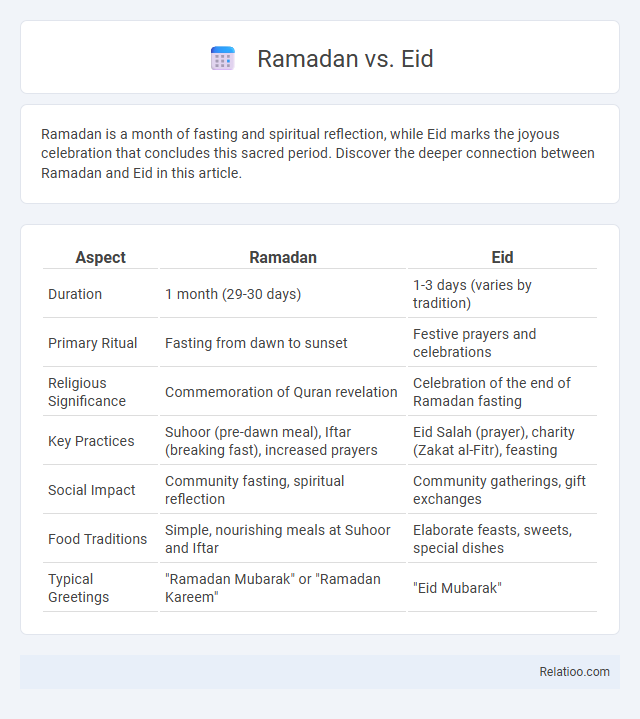Ramadan is a month of fasting and spiritual reflection, while Eid marks the joyous celebration that concludes this sacred period. Discover the deeper connection between Ramadan and Eid in this article.
Table of Comparison
| Aspect | Ramadan | Eid |
|---|---|---|
| Duration | 1 month (29-30 days) | 1-3 days (varies by tradition) |
| Primary Ritual | Fasting from dawn to sunset | Festive prayers and celebrations |
| Religious Significance | Commemoration of Quran revelation | Celebration of the end of Ramadan fasting |
| Key Practices | Suhoor (pre-dawn meal), Iftar (breaking fast), increased prayers | Eid Salah (prayer), charity (Zakat al-Fitr), feasting |
| Social Impact | Community fasting, spiritual reflection | Community gatherings, gift exchanges |
| Food Traditions | Simple, nourishing meals at Suhoor and Iftar | Elaborate feasts, sweets, special dishes |
| Typical Greetings | "Ramadan Mubarak" or "Ramadan Kareem" | "Eid Mubarak" |
Understanding Ramadan and Eid: Key Differences
Ramadan is a holy month in the Islamic calendar dedicated to fasting, prayer, and reflection, while Eid marks the festive celebration that concludes Ramadan, known as Eid al-Fitr. Ramadan lasts 29 to 30 days depending on the lunar calendar, whereas Eid is a single-day event characterized by communal prayers, feasting, and charity. Distinguishing Ramadan from Eid involves recognizing that Ramadan emphasizes spiritual discipline and self-control, whereas Eid focuses on joy, gratitude, and social bonding.
Historical Origins of Ramadan and Eid
Ramadan, a sacred month in Islam, traces its historical origins to the 7th century when Prophet Muhammad received the first revelation of the Quran, marking it as a period of fasting, prayer, and reflection. Eid al-Fitr, celebrated at the end of Ramadan, originates from early Islamic traditions established to break the month-long fast and express gratitude to Allah. These events are deeply rooted in Islamic history, symbolizing spiritual renewal and community unity among Muslims worldwide.
Religious Significance: Fasting vs Celebration
Ramadan is a holy month in Islam dedicated to fasting from dawn until sunset, serving as a time for spiritual reflection, self-discipline, and increased devotion to Allah. Eid al-Fitr marks the end of Ramadan and is celebrated with communal prayers, feasting, and charitable giving, symbolizing gratitude and joy after a month of fasting. Dates hold religious significance during Ramadan as they are traditionally consumed to break the fast each day, reflecting the practice of the Prophet Muhammad and providing essential nutrients after long hours of fasting.
Key Rituals: Ramadan Practices vs Eid Traditions
Ramadan involves key rituals such as fasting from dawn to sunset, increased prayers including Taraweeh, and Quranic recitations to deepen spiritual reflection. Eid al-Fitr marks the end of Ramadan with celebratory prayers, feasting, and giving Zakat al-Fitr to support the needy. Your participation in these practices highlights the spiritual discipline of Ramadan and the communal joy of Eid traditions.
Spiritual Meaning Behind Ramadan and Eid
Ramadan is a sacred month in Islam dedicated to fasting, prayer, and self-reflection, fostering spiritual growth and heightened devotion to Allah. Eid al-Fitr marks the end of Ramadan, symbolizing gratitude, community celebration, and the reward for a month of spiritual discipline. Dates hold significant spiritual value during Ramadan, traditionally used to break the fast as they provide natural energy and symbolize the Prophet Muhammad's practice.
Preparations for Ramadan Compared to Eid
Preparing for Ramadan involves organizing a schedule for fasting, prayer, and spiritual reflection, while also stocking up on essential foods like dates, lentils, and spices for Suhoor and Iftar meals. Eid preparations focus more on celebration, including buying new clothes, gifts, and special foods like sweets and biryani to share with family and friends. Your approach to Ramadan centers on discipline and devotion, while Eid planning emphasizes joyous gatherings and festive traditions.
Social Impact: Community During Ramadan vs Eid
Ramadan fosters a spirit of communal solidarity through shared fasting, nightly prayers (Taraweeh), and collective acts of charity (Zakat), strengthening social bonds within Muslim communities worldwide. Eid al-Fitr, marking the end of Ramadan, amplifies this unity by bringing families and friends together for festive celebrations, communal prayers, and gift exchanges, reinforcing social cohesion. Together, Ramadan and Eid cultivate a profound social impact by encouraging empathy, generosity, and a sense of belonging among diverse Muslim populations.
Common Foods: Ramadan Meals vs Eid Feasts
Ramadan meals typically feature nutritious and hydrating foods such as dates, lentil soup, and samosas to sustain fasting individuals throughout the day. Eid feasts, in contrast, offer more elaborate dishes including biryani, kebabs, and rich desserts like sheer khurma, symbolizing celebration and gratitude at the end of Ramadan. Dates serve as a symbolic and practical staple during Ramadan, providing quick energy and nutrients after daily fasting.
Gifts and Charity: Zakat During Ramadan and Eid
Ramadan emphasizes spiritual reflection and charitable giving, with Zakat being a mandatory form of almsgiving that Muslims pay to support the needy throughout the month. Eid al-Fitr marks the end of Ramadan and is celebrated by giving gifts and distributing Zakat al-Fitr, a specific charity to ensure all Muslims can partake in the festivities. Dates hold cultural and religious importance during Ramadan and Eid, often being gifted or shared to break fasts and symbolize generosity and community.
Ramadan and Eid in Modern Culture
Ramadan and Eid hold significant cultural and religious importance in modern society, with Ramadan being a month of fasting, reflection, and spiritual growth observed by over 1.8 billion Muslims worldwide. Eid al-Fitr, marking the end of Ramadan, is celebrated with communal prayers, feasting, and charitable giving, emphasizing unity and gratitude. Dates are traditionally consumed to break the fast during Ramadan, highlighting their nutritional value and role in Islamic tradition.

Infographic: Ramadan vs Eid
 relatioo.com
relatioo.com